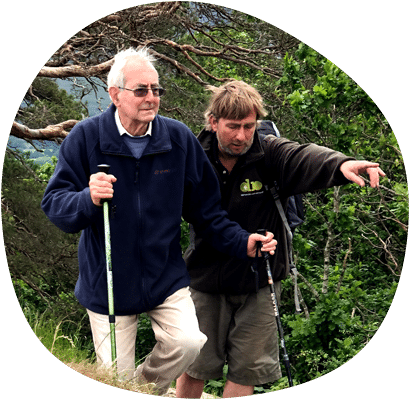
Time in nature is essential to our physical, emotional and mental wellbeing. It can calm our stress levels, increase our creativity, empathy and our sense of wonder and improve our social interactions and communication. Even small connections with nature can help reduce feelings of loneliness, isolation and anxiety, and bring significant health benefits. Persons with dementia can benefit from spending time in nature
Just 20 minutes of movement outside can stimulate the brain, releasing hormones that provide the right environment for the growth of new cells. Just sitting on a park bench beneath filtered sunlight can bring the light and oxygen that are essential to the function of our brains. Nature helps the brain release ‘happy hormones’ which are associated with feelings of pleasure, love and happiness. These hormones also reduce depression and anxiety and assist with learning, memory, motor system function, and essential processes like heart rate and digestion.
In 1984 a study found that patients in a hospital who had a view of nature recovered faster. Scientists have studied the health benefits of nature ever since, and have discovered just being in nature makes a difference. All the better if we can connect and interact such as holding a flower, listening to birdsong or digging in the dirt.
For people with dementia, research shows that meaningful outdoor activity and connection with the natural environment can have a positive effect and can slow down the progression of the symptoms.
A less well-known fact is that some trees and plants also release chemicals that have benefits to our health, for example pinene which is present in pine and spruce trees helps us to breathe more easily, allowing more air (and oxygen) into the lungs, and therefore the brain. It also has anti-inflammatory effects. Breathing deeply in a pine forest can bring some of these benefits.
It’s tempting to think it’s not worth going to the effort of taking someone with dementia outside because they will just forget it has happened. However research shows we may not remember the activity, but the ‘feel good factor’ may continue to make a person feel content well after the event. Persons with dementia have lost some of the factual and short term memory forebrain function but the part of the brain (the amygdala) which holds emotional memory is fully functional. A pleasurable experience in nature can cause a feeling of well-being and comfort to stay for a long time.
Excerpted from https://dementiaadventure.org/resources/the-benefits-of-nature/
Read more at https://pubmed.ncbi.nlm.nih.gov/28835119/ and https://www.nextavenue.org/finding-healing-dementia-outdoors/
This article is submitted by Dementia Friendly Community Initiative, which is a program of Whitewater Seniors in the Park. New members are always welcome. Contact jfrench@whitewater-wi.gov or call Jennifer French at 262 473 0535.






















